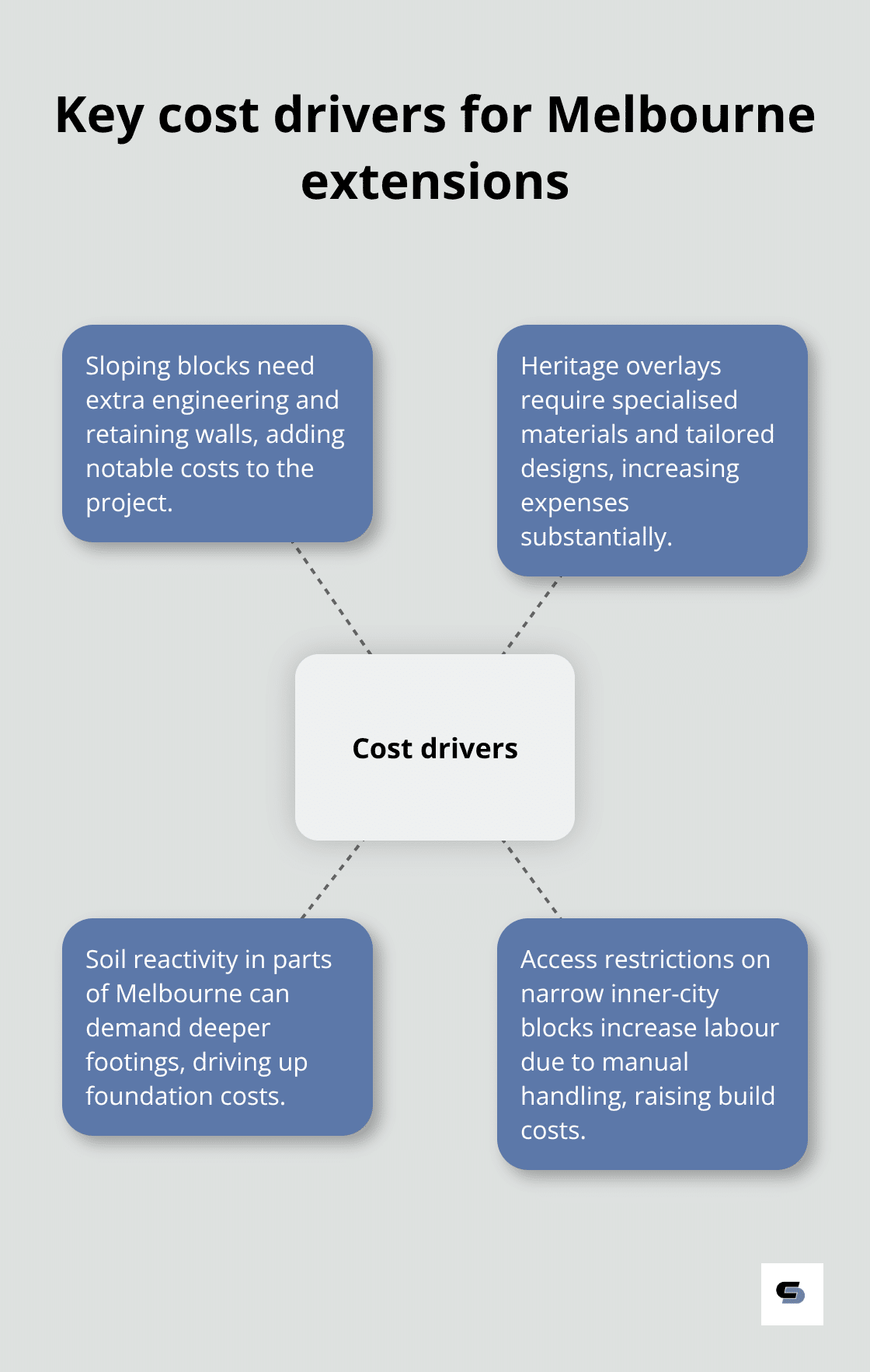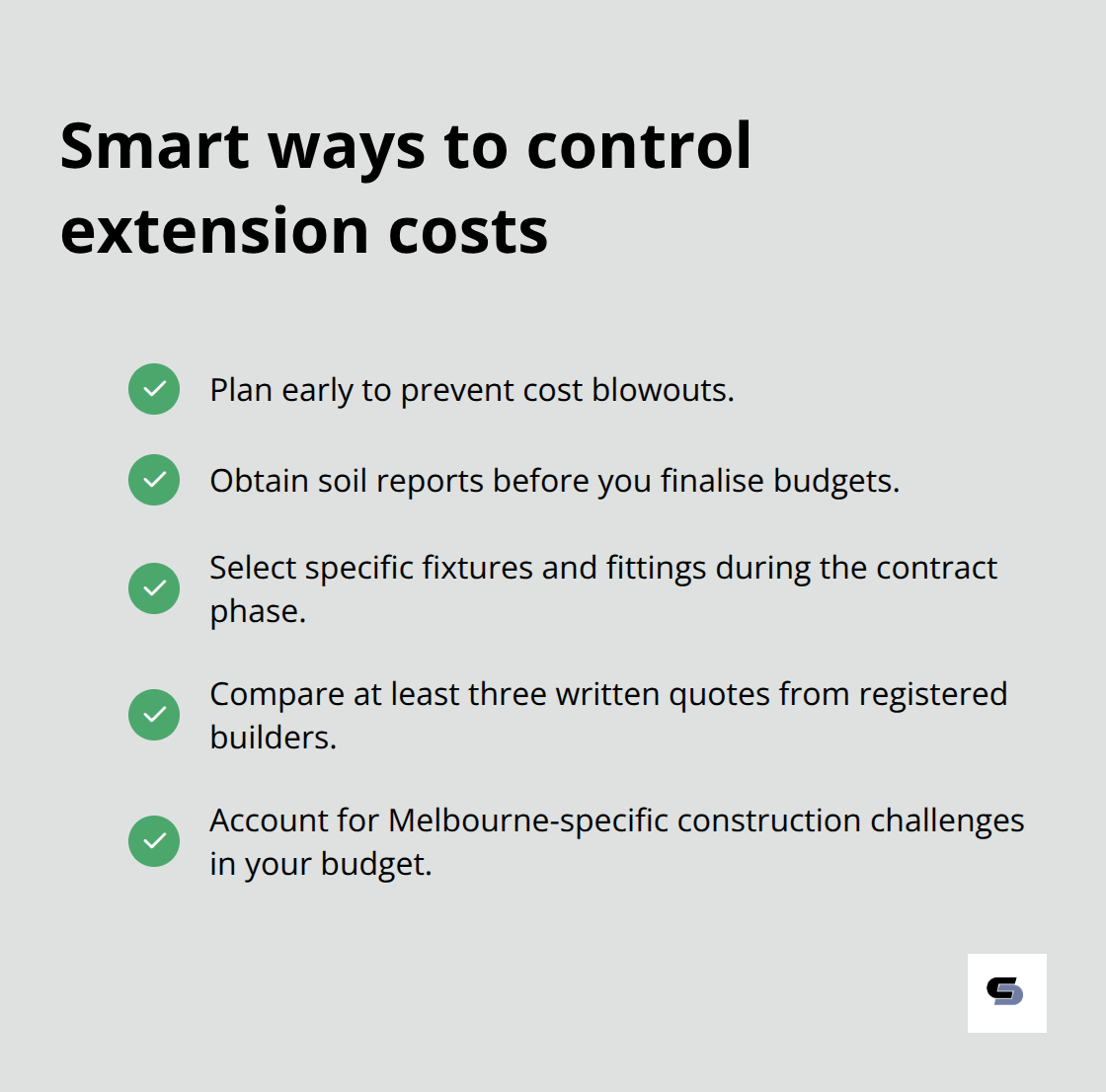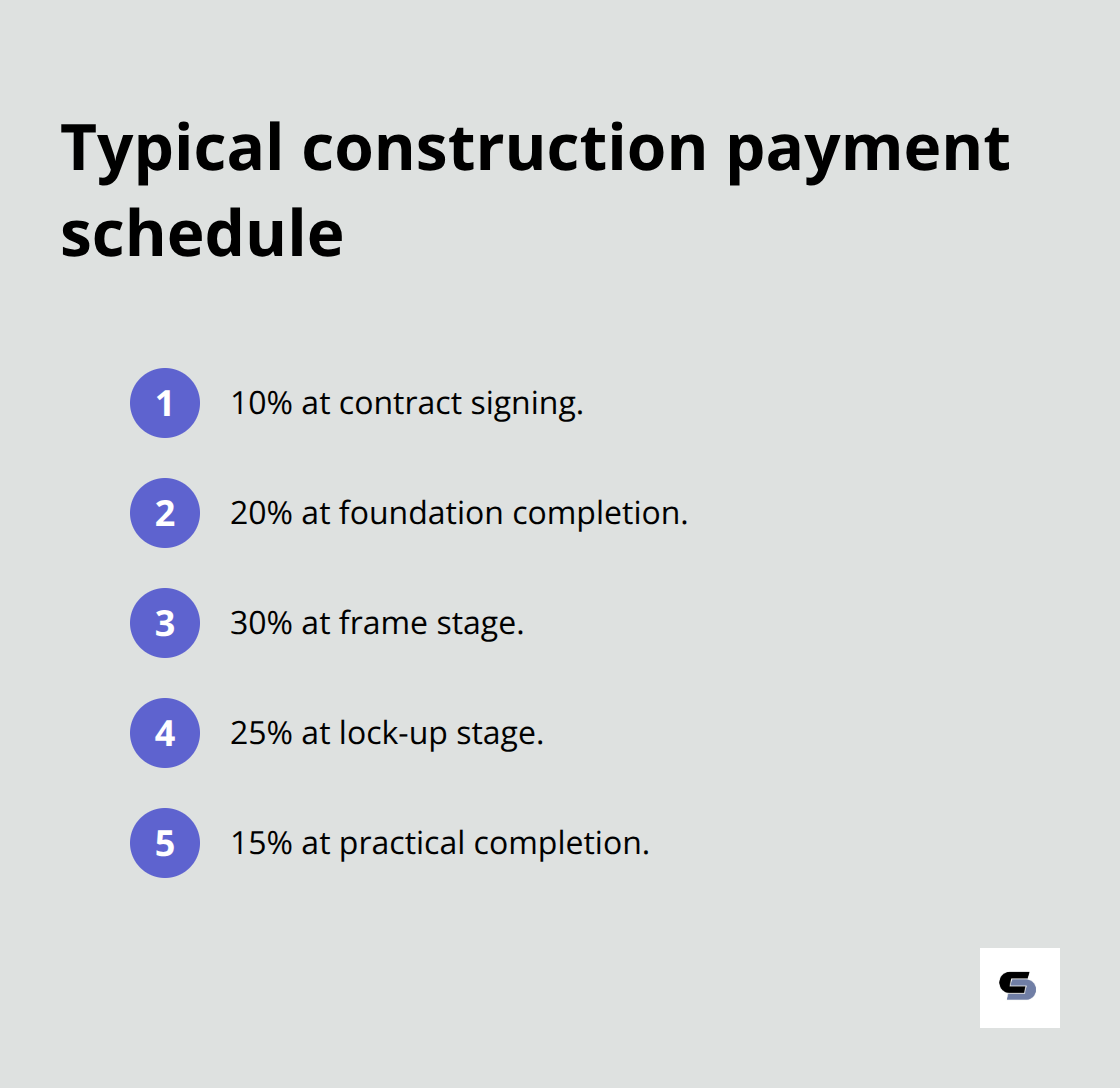How to Budget for a House Extension in Melbourne
Planning a house extension in Melbourne requires careful financial preparation. Extension costs vary significantly based on size, complexity, and location across Melbourne’s diverse suburbs.
We at Cameron Construction understand that knowing how to budget for a house extension in Melbourne can feel overwhelming for homeowners. This guide breaks down the essential budgeting steps to help you plan your project successfully.
What Do House Extensions Really Cost in Melbourne
Extension costs in Melbourne range from $2,800 to $4,500 per square metre for ground floor additions and $3,200 to $5,200 per square metre for double-storey extensions. Premium renovations with high-end finishes can reach $6,000 per square metre. Location significantly impacts costs, with inner-city suburbs like Toorak and Brighton commanding higher prices than outer suburbs due to site access challenges and council requirements.
Key Cost Drivers That Impact Your Budget
Site conditions determine major cost variations that many homeowners underestimate. Sloping blocks require additional engineering and retaining walls, which add significant costs to project budgets. Heritage overlays in suburbs like Kew and Hawthorn demand specialised materials and design approaches, which increase costs substantially. Soil conditions affect foundation requirements, with reactive clay soils common in Melbourne’s west requiring deeper footings that add considerable expense.

Access restrictions in narrow inner-city blocks increase labour costs due to manual handling requirements.
Hidden Expenses That Catch Homeowners Off Guard
Building permit and planning permit fees vary based on project value and scope according to Victorian Building Authority structures. Temporary accommodation during construction can represent a significant expense for Melbourne families undertaking major extensions. Utility connections including electricity, gas, and water upgrades often cost more than initial estimates. Professional fees for architects, engineers, and surveyors typically represent 10-15% of total project costs, yet many homeowners budget only 5-8%.
Smart Strategies to Control Extension Costs
Early planning prevents cost blowouts that derail extension projects. Obtain soil reports and foundation data before you finalise budgets, as these reports reveal potential structural challenges that affect costs. Select specific fixtures and fittings during the contract phase rather than leaving them unspecified, which prevents cost overruns later.

Compare at least three written quotes from registered builders to assess value and expectations clearly. These preparation steps help you establish realistic budgets that account for Melbourne’s unique construction challenges.
How Much Should You Actually Budget
Extension budgets require three distinct allocation phases that most Melbourne homeowners underestimate. Design and planning costs represent 12-18% of your total project budget and cover architectural plans, engineering reports, and permit applications through local councils. Construction costs consume 70-80% of your budget, while the remaining 10-15% should cover project management, site supervision, and final inspections. Victorian Building Authority data shows that projects over $50,000 require permits that cost $1,200-$3,500 (depending on scope), plus planning permits that range from $1,649 for major extensions. Professional fees including architects, structural engineers, and building surveyors typically cost $8,000-$15,000 for standard double-storey extensions.
Set Your Extension Budget Baseline
Start with your maximum comfortable spending limit, then reduce it by 25% to establish your working budget. This approach prevents financial stress when inevitable variations arise during construction. Melbourne extension projects experience cost increases that average 15-20% from initial estimates according to Master Builders Victoria data. Factor in temporary accommodation costs if your extension affects kitchen or bathroom access, as Melbourne rental costs average $450-$650 per week for suitable family properties. Include utility upgrade costs early, as older Melbourne homes often require electrical panel upgrades that cost $2,500-$4,500 to support modern extension requirements.
Why Contingency Funds Are Non-Negotiable
Extension contingency funds must cover three specific risk categories that affect Melbourne projects differently. Site condition surprises (including rock excavation or poor drainage) add $5,000-$15,000 to typical ground floor extensions. Council requirement changes during approval processes can trigger design modifications that cost $3,000-$8,000 in additional professional fees. The Melbourne Planning Scheme determines whether a planning permit is required for residential additions. Material price fluctuations affect projects that last 6-12 months, with timber and steel prices that vary 8-15% annually in Melbourne markets. Weather delays extend project timelines and increase holding costs including temporary accommodation and storage fees that accumulate quickly for Melbourne families.
Track Your Budget Through Construction Phases
Smart budget management requires phase-by-phase cost tracking that prevents overspend before it occurs. Pre-construction costs include permits, professional fees, and site preparation that typically consume 20-25% of your total budget. Foundation and structural work represents 30-35% of construction costs and requires careful monitoring as variations here affect all subsequent phases. Fit-out and finishing work accounts for 40-45% of construction costs but offers the most flexibility for cost adjustments if budget pressures emerge. Consider exploring cost-cutting techniques during this phase to maintain your budget targets.
Understanding these budget fundamentals prepares you to explore the various financing options available to Melbourne homeowners.
What Financing Options Work Best for Melbourne Extensions
Home equity loans represent the most cost-effective method to finance Melbourne extension projects, with major banks offering rates 1-2% below personal loan rates. Commonwealth Bank and ANZ provide home equity facilities up to 80% of property value, which typically covers extension costs of $100,000-$300,000 for most Melbourne homeowners. Refinancing your existing mortgage often delivers better rates than separate construction loans, particularly when your current rate exceeds 6%. Westpac’s renovation loans allow you to borrow against projected property value increases, which works well for extensions that add significant value in Melbourne’s strong property market.
Construction Loans Versus Traditional Financing
Construction loans suit large extensions over $200,000 but come with higher interest rates and complex drawdown schedules that many Melbourne homeowners find restrictive. NAB’s construction facility requires progress payments tied to building stages, which creates cash flow challenges during permit delays or weather interruptions common in Melbourne projects. Traditional home loans converted to construction purposes offer more flexibility and typically save $2,000-$5,000 in establishment fees compared to specialist construction products.
Government Grants and Rebate Programs
The First Home Owner Grant provides $10,000 for eligible buyers who undertake substantial renovations, while the Victorian Energy Upgrades program offers discounts and rebates on energy-efficient equipment and appliances for extensions (including insulation and efficient heating systems). The Home Builder Grant previously offered $25,000 for substantial renovations but ended in April 2021, though similar programs may return based on economic conditions. Solar rebates through Solar Victoria provide up to $1,400 for rooftop installations on new extension areas, plus interest-free loans up to $1,888 for battery storage systems.
Council Incentives and Rate Concessions
Council rates concessions apply to some heritage properties that undergo approved extensions, with Melbourne City Council offering up to 50% rate reductions during construction periods. The Building Upgrade Finance program assists commercial-residential conversions with low-interest loans, though residential extensions typically don’t qualify for these schemes. Some councils waive development contribution fees for extensions that meet specific sustainability criteria or heritage preservation requirements.
Payment Schedules That Protect Your Cash Flow
Banks structure extension loan drawdowns to match construction milestones, which protects both lender and borrower interests. Typical payment schedules release 10% at contract signing, 20% at foundation completion, 30% at frame stage, 25% at lock-up stage, and 15% at practical completion.

This structure prevents contractors from receiving excessive upfront payments while maintaining steady cash flow throughout your project timeline.
Final Thoughts
Successful extension budgets require three fundamental strategies that Melbourne homeowners must implement from project inception. Allocate 25% above your initial estimates to cover inevitable variations, site conditions, and permit requirements that affect most Melbourne projects. Professional cost estimation through qualified builders and quantity surveyors prevents the budget blowouts that derail 40% of residential extensions according to Master Builders Victoria data.
Understanding how to budget for a house extension in Melbourne means you recognise that preparation costs represent 20-25% of your total investment, while construction consumes 70-80% of available funds. The remaining budget covers contingencies and professional oversight that protect your investment throughout the construction process. Early engagement with experienced professionals establishes realistic cost expectations and prevents financial surprises during construction.
We at Cameron Construction recommend you engage experienced professionals early in your planning phase to establish realistic cost expectations. Our team provides the expertise needed to navigate council requirements, site challenges, and budget management effectively across Melbourne’s diverse suburbs. Start your extension journey by obtaining detailed quotes from registered extension builders who understand Melbourne’s unique construction environment (professional guidance transforms extension dreams into successful reality while protecting your financial investment).






